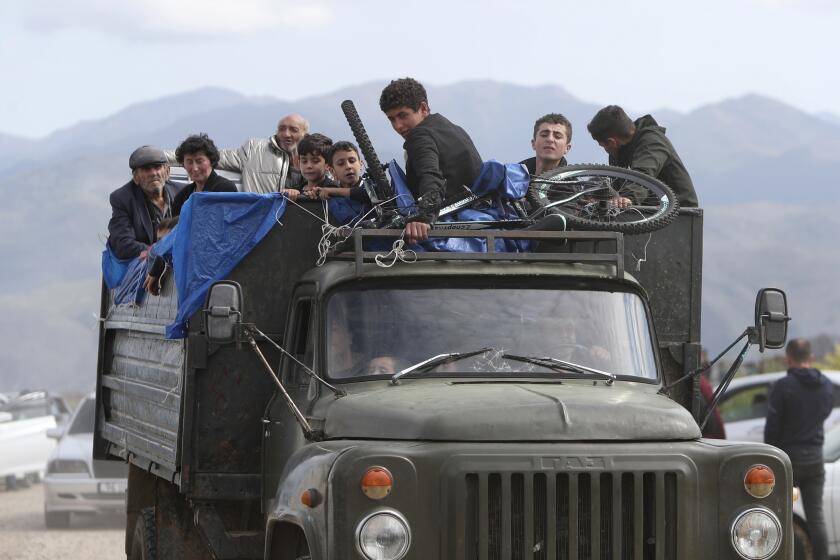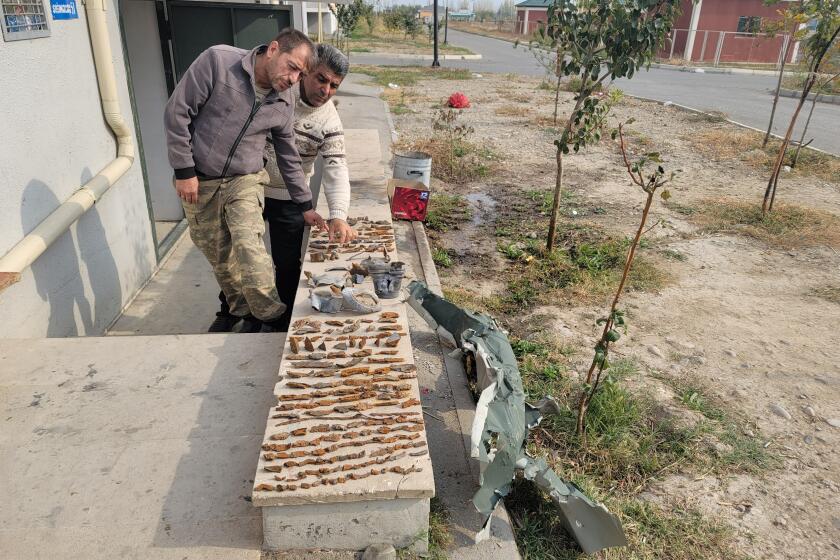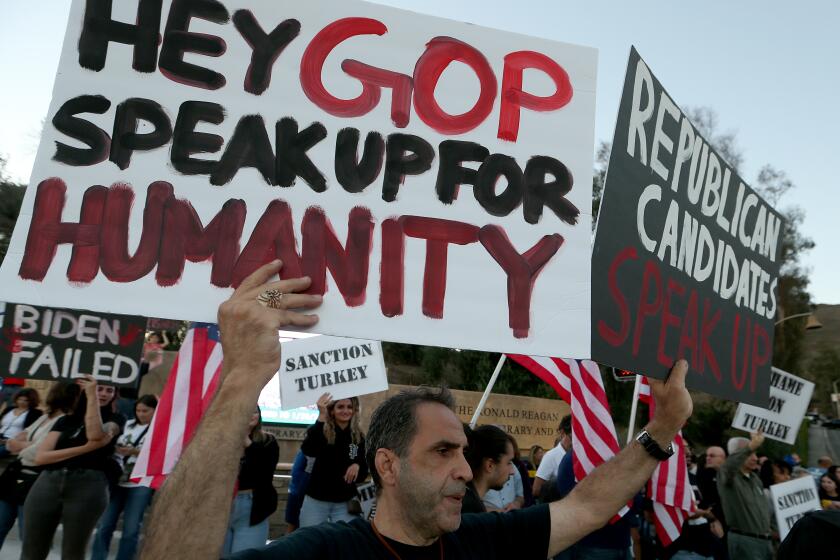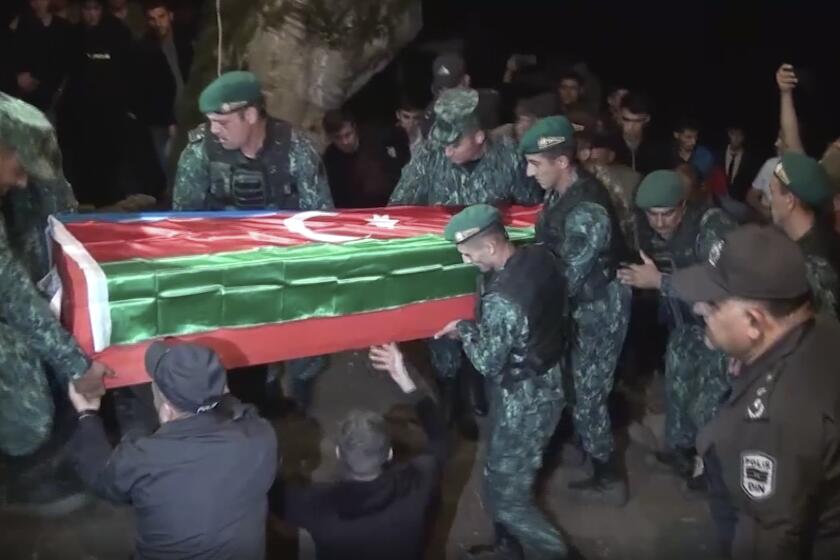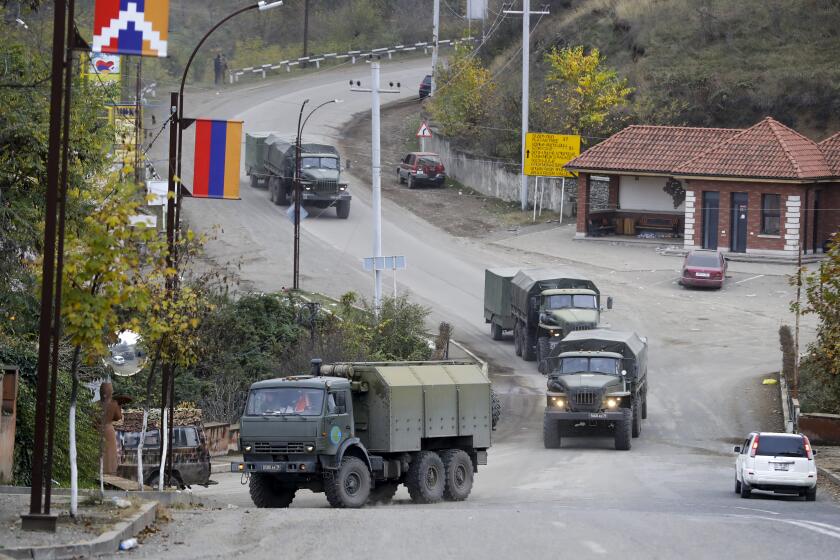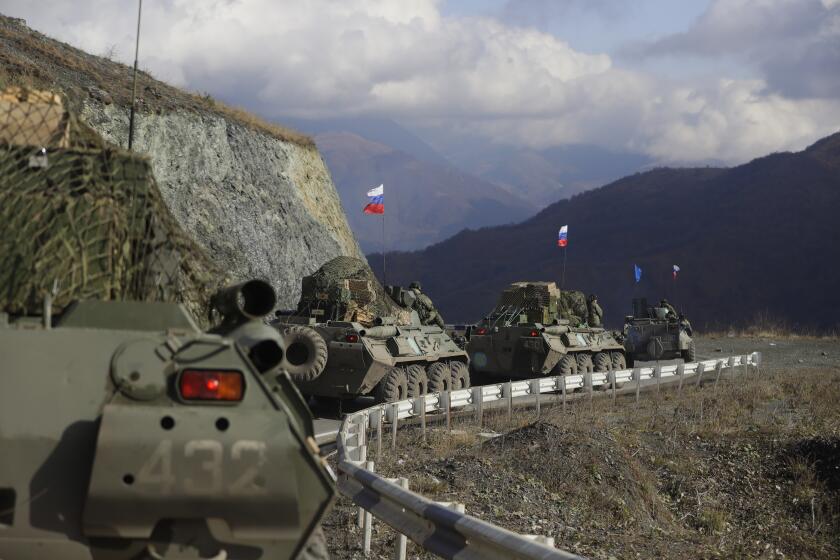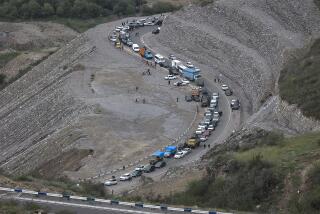Nagorno-Karabakh’s separatist government says it will disband by year’s end
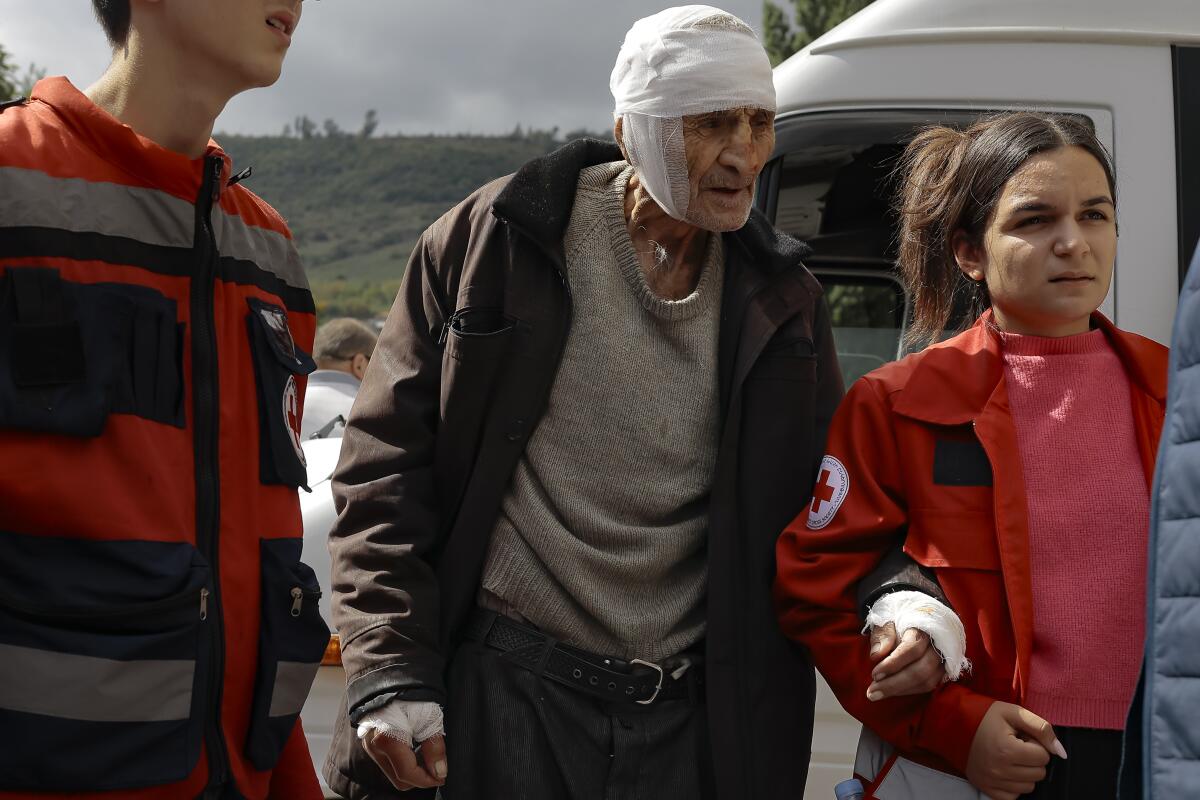
YEREVAN, Armenia — The separatist government of Nagorno-Karabakh announced Thursday that it will dissolve itself and that the internationally unrecognized Artsakh Republic will cease to exist by Jan. 1 after a nearly three-decade bid for independence, as Armenian officials said roughly two-thirds of the breakaway region’s population has already fled.
The developments come after Azerbaijan carried out a lightning offensive to reclaim full control over the region and demanded that ethnic Armenian separatists in Nagorno-Karabakh lay down their weapons and that the secessionist government disband.
A decree signed by Samvel Shakhramanyan, the president of the self-declared republic, cited an agreement reached Sept. 20 to end the fighting, under which Azerbaijan is to allow the “free, voluntary and unhindered movement” of Nagorno-Karabakh residents to Armenia.
Some of those who fled the regional capital, Stepanakert, said they had no hope for the future.
“I left Stepanakert having a slight hope that maybe something will change and I will come back soon, and these hopes are ruined after reading about the dissolution of our government,” said Ani Abaghyan, a 21-year-old student.
Lawyer Anush Shahramanyan, 30, added: “We can never go back to our homes without having an independent government in Artsakh” — Nagorno-Karabakh’s Armenian name.
Armenians’ fury over Azerbaijan’s recapture of Nagorno-Karabakh has focused on Armenian Prime Minister Nikol Pashinyan. Could his government go next?
The mass exodus of ethnic Armenians from the mountainous region inside Azerbaijan began Sunday. By Thursday evening, over 78,300 people — about two-thirds of Nagorno-Karabakh’s population of 120,000 — had fled to Armenia, according to Armenian officials, who said that the influx is continuing unabated.
After separatist fighting ended in 1994 following the collapse of the Soviet Union, Nagorno-Karabakh came under the control of ethnic Armenian forces, backed by Armenia. Then, during a six-week war in 2020, Azerbaijan took back parts of the region in the south Caucasus Mountains along with surrounding territory that Armenian forces had claimed earlier.
Nagorno-Karabakh was internationally recognized as part of Azerbaijan’s sovereign territory.
Following the latest offensive and a cease-fire agreement brokered by Russian peacekeepers, Azerbaijan and Nagorno-Karabakh separatist authorities have begun talks on “reintegrating” the region back into Azerbaijan. Azerbaijani authorities have pledged to respect the rights of ethnic Armenians in the region and restore supplies after a 10-month blockade. Many local residents, however, fear reprisals and have decided to leave for Armenia.
Deadly fighting over Nagorno-Karabakh has caused grief and anger. But for many Azerbaijanis displaced by the conflict, it’s also brought hope.
In December, Azerbaijan imposed a blockade of the only road connecting Nagorno-Karabakh to Armenia, accusing the Armenian government of using the road for mineral extraction and illicit weapons shipments to the region’s separatist forces.
Armenia alleged that the closure denied basic food and fuel supplies to Nagorno-Karabakh. Azerbaijan rejected the accusation, arguing that the region could receive supplies through the Azerbaijani city of Aghdam — a solution long resisted by Nagorno-Karabakh authorities, who called it a strategy for Azerbaijan to gain control of the region.
Weakened by the blockade, and with Armenia’s leadership distancing itself from the conflict, ethnic Armenian forces in the region agreed to lay down arms less than 24 hours after Azerbaijan began its offensive last week. Talks have begun between Baku and Nagorno-Karabakh’s separatist authorities on “reintegrating” the region into Azerbaijan.
Ahead of the second GOP presidential debate, dozens of Armenian Americans and supporters rallied at the Ronald Reagan Presidential Library to bring attention to the developments in Nagorno-Karabakh.
Azerbaijani authorities have pledged to respect the rights of ethnic Armenians in the region and restore supplies.
Many residents, however, have decided to leave for Armenia, fearing reprisals. The only road linking Nagorno-Karabakh to Armenia quickly filled with cars, creating a massive traffic jam on the winding mountain road.
It took Abaghyan, the student, three days to get to Armenia from Stepanakert, a distance of about 50 miles.
Shahramanyan spent 30 hours on the road and still had half the journey ahead of her Thursday.
Breaking News
Get breaking news, investigations, analysis and more signature journalism from the Los Angeles Times in your inbox.
You may occasionally receive promotional content from the Los Angeles Times.
She said that for her and her family, living in Nagorno-Karabakh will be impossible under Azerbaijan rule because she believes their basic rights will be violated.
“No power in the world is willing to stop the atrocities of Azerbaijan. What can any Armenian hope for under the control of that genocidal state?” she said.
Azerbaijan’s military last week accused residents of burning down their homes in Martakert, a town in the north of the region that until last week’s offensive remained under the control of ethnic Armenian forces. Their claims could not be independently verified. But that is something that happened in 2020 when people fled territories taken over by Azerbaijan.
On Monday night, a fuel reservoir exploded at a gas station where people seeking to leave were lining up for gas, which because of the blockade had been in short supply. At least 68 people were killed and nearly 300 injured, with more than 100 still considered missing.
The disputed Nagorno-Karabakh region pits the two former Soviet republics as alliances with Russia and the West shift.
It isn’t immediately clear if any of the ethnic Armenians who have populated the region will remain there. Shakhramanyan’s decree Thursday urged residents — including those who left — “to familiarize themselves with the conditions of reintegration offered by the Republic of Azerbaijan, in order to then make an individual decision about the possibility of staying in (or returning to) Nagorno-Karabakh.”
Azerbaijan’s Foreign Ministry on Thursday also urged the Armenian population of the region “not to leave their places of residence and become part of the multinational Azerbaijan.”
Azerbaijani authorities said they were sending 30 buses to Stepanakert at the request of “the Armenian residents” for those who don’t have cars but want to go to Armenia.
In Yerevan, Armenian Prime Minister Nikol Pashinyan said that “in the coming days, there will be no Armenians left in Nagorno-Karabakh.”
Azerbaijan has completed its takeover of territory ceded by Armenia around Nagorno-Karabakh after weeks of heavy fighting.
“This is a direct act of an ethnic cleansing and depriving people of their motherland, exactly what we’ve telling the international community about,” he said.
In a statement, Azerbaijan’s Foreign Ministry said it “strongly” rejected Pashinyan’s accusations.
“Pashinyan knows well enough that the current departure of Armenians from Azerbaijan’s Karabakh region is their personal and individual decision and has nothing to do with forced relocation,” the ministry said. “With this alarming narrative, the Armenian prime minister is seeking to disrupt Azerbaijan’s efforts to provide humanitarian assistance and the reintegration process, and also undermines possible prospects for peace between Azerbaijan and Armenia.”
Armenia has set up two main centers, in the cities of Goris and Vayk, to register and assess the needs of those fleeing Nagorno-Karabakh. The government is offering accommodation to anyone who doesn’t have a place to stay, although only 13,922 of the 70,500 people who have crossed into the country — under 20% — applied for it.
The Russian Foreign Ministry has summoned the ambassador from longtime ally Armenia to protest upcoming joint military exercises with the United States.
“The accommodation suggested by the government is mostly in the border villages, where people face serious security issues due to the periodic shootings by Azerbaijan. Besides, finding a job is difficult,” said Tatevik Khachatrian, who arrived Thursday. She said she and her family will stay with relatives in Yerevan before trying to rent an apartment.
On Thursday, Azerbaijani authorities charged Ruben Vardanyan, a former head of Nagorno-Karabakh’s separatist government who was arrested a day earlier, with financing terrorism, creating illegal armed formations and illegally crossing a state border. Vardanyan, a billionaire banker who was arrested Wednesday, faces up to 14 years in prison if convicted, according to Russian state news agency RIA Novosti.
Azerbaijani officials said Vardanyan, a billionaire who made his fortune in Russia, was detained as he was trying to cross into Armenia along with thousands of others. He was escorted to Azerbaijan’s capital, Baku. His arrest appeared to indicate Azerbaijan’s intention to quickly enforce its grip on the region.
Vardanyan moved to Nagorno-Karabakh in 2022 and served as the head of the regional government for several months before stepping down earlier this year.
Armenia and Azerbaijan enlist artists, lobbyists and online activists in a 21st century propaganda war in their fight over Nagorno-Karabakh.
Another top separatist figure, David Babayan, Nagorno-Karabakh’s former foreign minister and now presidential advisor, said Thursday he would surrender to Azerbaijani authorities after they “demanded my arrival in Baku for a proper investigation.” Babayan said in a Facebook post that he would head from Stepanakert to the nearby city of Shusha, also called Shushi, which has been under Azerbaijani control since 2020.
“My failure to appear, or worse, my escape, will cause serious harm to our long-suffering people, to many people, and I, as an honest person, hard worker, patriot and a Christian, cannot allow this,” Babayan said.
More to Read
Sign up for Essential California
The most important California stories and recommendations in your inbox every morning.
You may occasionally receive promotional content from the Los Angeles Times.
